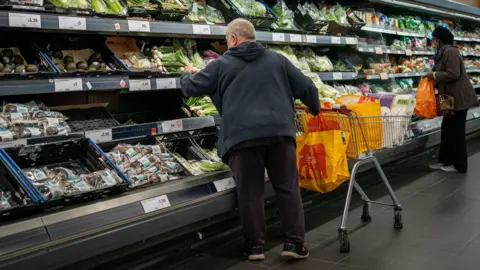Supermarket price war looms as Sainsbury's joins fight
 PA Media
PA MediaSainsbury's has forecast that shop profits will flatline or fall in the coming year as the supermarket sector prepares for a possible price war.
The retailer said it expects income to dip to £1bn as it continues to invest in lowering grocery prices.
Last week, Tesco admitted that it could take a significant hit if it is forced to cut prices after Asda - now under the leadership of industry veteran Allan Leighton - announced it would reduce grocery costs to boost the struggling store.
A race to lower prices could help households who are still struggling with the cost of living at a time when bills, such as energy and water, are increasing.
"We're in the strongest position we've ever been [on price competition] and we intend to stay there," said Sainsbury's chief executive Simon Roberts.
The company expects the impact of lowering prices to be relatively small compared to a potential £400m hit announced by Tesco.
Sainsbury's predicts underlying retail profit will tick down by around £36m over the year.
This, said Bernstein analyst William Woods, gives the supermarket "wiggle room" to fight with Tesco and Asda if needed.
While supermarkets are always competing with each other over price, the threat of a more intensive clash arose in March when Mr Leighton said Asda would take a hit to its profits in order to reduce prices, rebuild market share and win back customers.
At the time, the likes of Tesco and Sainsbury's saw their share prices plunge on speculation they would be forced to fund millions of pounds worth in price cuts to compete with Asda.
Mr Leighton was Asda's chief executive between 1996 and 2001 and returned last year as executive chairman to turn the business around after a period of falling sales and under-investment.
Sainsbury's set out its expectations as it revealed that full-year sales rose by 3.1% to £31.5bn. Pre-tax profit jumped from £277m to £384m.
Mr Roberts declined to comment on what effect US President Donald Trump's tariffs could have on the business, which also owns Argos and the Habitat brand.
There has been speculation that China, faced with high tariffs on selling goods to the US, might re-route products to other countries and sell them cheaply to offload them.
Mr Roberts said that Sainsbury's was "watching developments carefully".
While revenue at Sainsbury's grew strongly over the 12 months to 1 March, sales continued to fall at Argos although it said that the situation improved as it boosted traffic to the brand's website.
The supermarket also reported an 8.9% drop in fuel sales to £4.7bn. It blamed "reduced demand" as well as the lower cost of petrol and diesel due to "falling commodity prices in a highly competitive market".
Official data released on Wednesday showed that the falling cost of motor fuel helped drive down the overall rate of inflation.
Inflation eased by more than expected to 2.6% in the year to March, from 2.8% in February.
